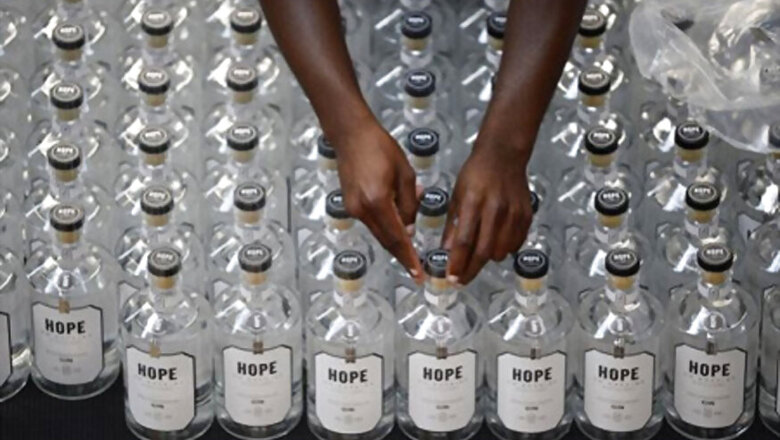
views
Piling in for after-work drinks, around two dozen people pore over the menu at Mother's Ruin, a speciality gin bar in Cape Town, where homegrown varieties are making a mark on the global scene.
The menu is a daunting tome of 144 gins from around the globe, over 20 of them South African and steeped in the flavours of the country's unique coastal mountains.
"Those are very popular -- all the foreigners that come in here want to see what gins South Africa has to offer," says part owner Will Pretorius, whose current favourite is A Mari, a variety from Cape Town distilled with seawater.
"Gin around the world is starting to have a moment and South Africa has jumped on the bandwagon," says gin maker Lucy Beard.
In 2015, her gin distillery Hope On Hopkins was the first to be licensed in Cape Town, just as the drink began to make a stir.
"Very soon after, small gin distilleries began popping up in Cape Town and its surrounds, with quite a few on the wine farms, too," she adds.
Formerly lawyers based in London, Beard and her partner Leigh Lisk, who are both South African, turned their hand to gin after taking a year off to travel around Europe.
"There were little craft distilleries everywhere," says Beard.
"It was basically a passing comment: 'Do you think we could make gin?' We downloaded a book on distilling to our Kindles and sat in a campsite in Spain reading it."
It's a simple enough process: spirits are distilled with what gin makers call botanicals to add flavour. The only rule -- one of those flavours must be juniper.
What then distinguishes one gin from the next is everything else the distiller chooses to add to the mix.
In South Africa, that has predominantly been the flowers and herbs of the mountains surrounding Cape Town, collectively called "fynbos": sweet kapokbos, strong and fresh buchu, dry rooibos, rose geranium, wild olives, honeybush -- a mountainside riot of choice.
Local flavours
"There are so many flavours to experiment with," says Simon Von Witt of Woodstock Gin, a hole-in-the-wall affair on a busy Cape Town road, with a coffee shop upfront and a distillery round the back that produces about 1,000 bottles a month.
The shop is a beehive of activity to meet an order due for export to Belgium the next day.
"Fynbos has thousands of varieties, so you're looking at a massive amount you can work with," says Von Witt.
His ingredient of choice is rooibos, a plant famous for the tea brewed from its leaves and the predominant ingredient of Woodstock Gin's bestselling variety, aptly named High Tea.
"The rooibos is quite dry and the honeybush contrasts that -- it's slightly sweet and it just brings out amazing flavours," he says. "It's such a uniquely South African plant."
Gin itself, though, has not been a typical drink in South Africa, where beer, wine and brandy dominate.
Some 78 percent of all alcohol consumed here in 2015 was beer, according to the South African Wine Industry Information & Systems body.
Gin accounted for just 0.1 percent, only ahead of South Africa's cane spirit distilled from fermented molasses.
"I like that it's easy to drink -- sometimes too easy!" said Amy Bennet, visiting the southwestern city from Durban, sipping on Inverroche, another local fynbos-tinged gin.
She began drinking gin while living in London as an alternative to the heavy beers and ales on offer, she said.
'Everybody's curious'
Mother's Ruin attracts a large and varied clientele paying about 32 rand ($2.40, 2.20 euros) for a shot of top-quality local gin.
"From older people, to tourists, to young people," says Pretorius, "everybody's curious about gin... people want to taste it, experience it, see what the possibilities are with it."
But as gin enjoys its moment, the oversaturated market in South African craft beers offers a warning.
"I don't want to be in a bubble," says Von Witt.
The trick would be to make a gin that appeals "to everyone, right across the board, from millennials to the older generation".
"We're not there yet," he adds.
But Beard is hopeful.
"The fervour around it will die out eventually, but there will always be those people who love to reach for a good, craft gin," she said.


















Comments
0 comment